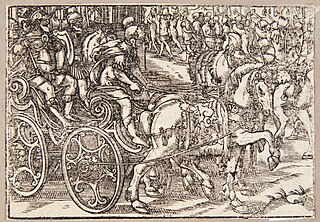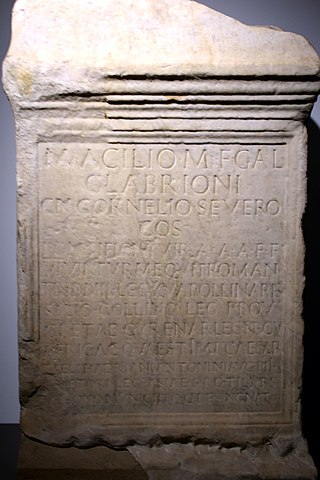Related Research Articles
The gens Acilia was a plebeian family at ancient Rome, that flourished from the middle of the third century BC until at least the fifth century AD, a period of seven hundred years. The first of the gens to achieve prominence was Gaius Acilius, who was quaestor in 203 and tribune of the plebs in 197 BC.
Manius Acilius Glabrio was a Roman statesman and general, grandson of the jurist Publius Mucius Scaevola.

The gens Valeria was a patrician family at ancient Rome, prominent from the very beginning of the Republic to the latest period of the Empire. Publius Valerius Poplicola was one of the consuls in 509 BC, the year that saw the overthrow of the Tarquins, and the members of his family were among the most celebrated statesmen and generals at the beginning of the Republic. Over the next ten centuries, few gentes produced as many distinguished men, and at every period the name of Valerius was constantly to be found in the lists of annual magistrates, and held in the highest honour. Several of the emperors claimed descent from the Valerii, whose name they bore as part of their official nomenclature.

The gens Aemilia, originally written Aimilia, was one of the greatest patrician families at ancient Rome. The gens was of great antiquity, and claimed descent from Numa Pompilius, the second King of Rome. Its members held the highest offices of the state, from the early decades of the Republic to imperial times. The Aemilii were almost certainly one of the gentes maiores, the most important of the patrician families. Their name was associated with three major roads, an administrative region of Italy, and the Basilica Aemilia at Rome.

Manius Acilius Glabrio was a plebeian Roman politician and general during the Republican. He served as consul in 191 BC while Rome was at war with the Seleucid Empire. He defeated Emperor Antiochus the Great at Thermopylae, helping establish Roman unipolar control over the Mediterranean, and was awarded a triumph. Credible accusations that he had embezzled spoils from his conquests in Greece while consul caused him to withdraw from his attempt to run for censor, after which he largely retired from public life.

The gens Aquillia or Aquilia was a plebeian family of great antiquity at ancient Rome. Two of the Aquillii are mentioned among the Roman nobles who conspired to bring back the Tarquins, and a member of the house, Gaius Aquillius Tuscus, was consul in 487 BC.
Acilius Glabrio may refer to:
Manius Acilius Glabrio was a Roman Senator who served as consul ordinarius in AD 91 as the colleague of Trajan, afterwards emperor. Although one of many senators executed during the reign of Domitian on the alleged grounds of plotting against the emperor, he was remembered by his contemporaries best for his strength. Domitian summoned Glabrio during the latter's consulate to his Alban estate during the festival of the Juvenalia to kill a large lion; not only did Glabrio despatch the beast, but he escaped all injury. Following his defeat of the lion, Glabrio was banished by Domitian, then executed while in exile.

The gens Sempronia was one of the most ancient and noble houses of ancient Rome. Although the oldest branch of this gens was patrician, with Aulus Sempronius Atratinus obtaining the consulship in 497 BC, the thirteenth year of the Republic, but from the time of the Samnite Wars onward, most if not all of the Sempronii appearing in history were plebeians. Although the Sempronii were illustrious under the Republic, few of them attained any importance or notice in imperial times.
The gens Otacilia, originally Octacilia, was a plebeian family at ancient Rome. The gens first rose to prominence during the First Punic War, but afterwards lapsed into obscurity. The first of the family to obtain the consulship was Manius Otacilius Crassus, in 263 BC.

The gens Pomponia was a plebeian family at ancient Rome. Its members appear throughout the history of the Roman Republic, and into imperial times. The first of the gens to achieve prominence was Marcus Pomponius, tribune of the plebs in 449 BC; the first who obtained the consulship was Manius Pomponius Matho in 233 BC.
Anicius Acilius Glabrio Faustus was an aristocrat of the later Roman Empire. He was Urban prefect three times before 437, consul in 438, and briefly Praetorian prefect of Italy in 442. Faustus was selected to promulgate the Theodosian Code in the Western Empire.

The gens Sergia was a patrician family at ancient Rome, which held the highest offices of the Roman state from the first century of the Republic until imperial times. The first of the Sergii to obtain the consulship was Lucius Sergius Fidenas in 437 BC. Despite long and distinguished service, toward the end of the Republic the reputation of this gens suffered as a result of the conspiracy of Catiline.
Lucius Vinicius was a Roman Senator who was appointed suffect consul in 33 BC.

The gens Fonteia was a plebeian family at ancient Rome. Members of this gens are first mentioned toward the end of the third century BC; Titus Fonteius was a legate of Publius Cornelius Scipio during the Second Punic War. The first of the Fonteii to obtain the consulship was Gaius Fonteius Capito, consul suffectus in 33 BC.

The Temple of Piety was a Roman temple dedicated to the goddess Pietas, a deified personification of piety. It was erected in 181 BC at the northern end of the Forum Olitorium, the Roman vegetable market, and demolished in 44 BC to make room for the building eventually known as the Theater of Marcellus. It seems to have been rebuilt and its services continued well into the imperial period, although this is disputed by some scholars.

Manius Acilius Glabrio Gnaeus Cornelius Severus was a senator of the Roman Empire. He was consul ordinarius in 152 with Marcus Valerius Homullus as his colleague. Acilius Glabrio is known almost solely from surviving inscriptions.
The gens Metilia was a minor family at ancient Rome. Although they occur throughout Roman history, and several were tribunes of the plebs, beginning in the fifth century BC, none of the Metilii attained the higher offices of the Roman state until imperial times, when several of them became consul.
The gens Rubria was a plebeian family at ancient Rome. Members of this gens are first mentioned in the time of the Gracchi, but they did not rise to prominence until imperial times. The first of the Rubrii to obtain the consulship was Rubrius Gallus, some time before AD 68.
Manius Acilius Glabrio was a Roman politician in the second century BC.
References
- ↑ e. g., "Chronological Table of Roman History" (BC 33), in the Dictionary of Greek and Roman Biography and Mythology , William Smith, ed., vol. III, p. 1370.
- ↑ Syme, Ronald, "The Augustan Aristocracy" (1986). Clarendon Press , pp. 28-29.[ ISBN missing ]
- ↑ Broughton, p. 413